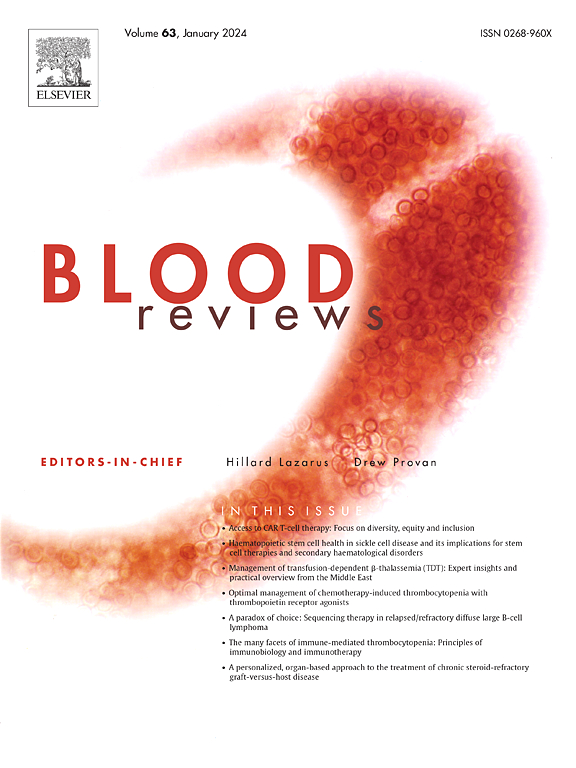PET scan for the detection of histological transformation of follicular lymphoma: A systematic review of diagnostic performance
IF 5.7
2区 医学
Q1 HEMATOLOGY
引用次数: 0
Abstract
The strength of evidence supporting use of PET in the evaluation of suspected histological transformation (HT) of follicular lymphoma (FL) is unknown. We conducted a systematic review of studies reporting the diagnostic performance of ≥1 PET parameters for the detection of HT in patients with known FL. We searched PubMed for any study reporting ≥1 diagnostic performance metrics. Risk of bias was evaluated with the QUADAS2 tool. We included 7 studies encompassing 152 patients with a biopsy showing FL (or indolent non-Hodgkin lymphoma) and 111 with a biopsy confirming HT. Study designs and study populations differed substantially. PET methods were poorly reported and 18F-FDG dose was highly variable. Most studies were judged to be at high risk of bias in the patient and index test domains of QUADAS2. The diagnostic performance of 5 PET parameters were reported in at least one study but only SUVmax (n = 7) was reported in >2. Median SUVmax ranged from 9.2 to 10.9 in FL/iNHL and from 13.7 to 24.4 in HT. While SUVmax was consistently higher in the HT group, there was considerable overlap between the two groups and significant variability between studies. Area under the ROC curve for SUVmax to distinguish between FL/iNHL and HT ranged from 0.68 to 0.97. Sensitivity and specificity of the proposed cutoffs also varied widely (sensitivity ∼0.6 to 1, specificity ∼0.4 to 1). In conclusion, few studies — mostly small and potentially biased — have addressed this question. Although SUVmax is generally higher in HT than in FL, the diagnostic performance and optimal cutoffs remain unclear. Proposed SUVmax cutoffs should not be used to determine whether a patient has HT or to decide whether a biopsy should be obtained. For now, we encourage physicians to evaluate results of their own practice to devise a prudent workup of suspected.
PET扫描对滤泡性淋巴瘤组织学转化的检测:诊断表现的系统回顾。
支持使用PET评估滤泡性淋巴瘤(FL)疑似组织学转化(HT)的证据强度尚不清楚。我们对报道≥1个PET参数对已知FL患者HT检测诊断性能的研究进行了系统回顾。我们检索了PubMed中所有报道≥1个诊断性能指标的研究。使用QUADAS2工具评估偏倚风险。我们纳入了7项研究,包括152例活检显示FL(或惰性非霍奇金淋巴瘤)和111例活检证实HT的患者。研究设计和研究人群差异很大。PET方法报道较少,18F-FDG剂量变化很大。大多数研究被认为在QUADAS2的患者和指数测试域具有高偏倚风险。至少有一项研究报道了5个PET参数的诊断性能,但在bbbb2中仅报道了SUVmax (n = 7)。FL/iNHL的中位SUVmax为9.2 - 10.9,HT为13.7 - 24.4。虽然HT组的SUVmax一直较高,但两组之间存在相当大的重叠,且研究之间存在显著差异。SUVmax用于区分FL/iNHL和HT的ROC曲线下面积为0.68 ~ 0.97。所提出的截止点的敏感性和特异性也有很大差异(敏感性~ 0.6至1,特异性~ 0.4至1)。总之,很少有研究(大多是小规模且可能存在偏见的研究)解决了这个问题。虽然SUVmax在HT中普遍高于FL,但诊断性能和最佳临界值仍不清楚。建议的SUVmax临界值不应用于确定患者是否患有HT或决定是否应进行活检。目前,我们鼓励医生评估他们自己的实践结果,以设计一个谨慎的检查疑似。
本文章由计算机程序翻译,如有差异,请以英文原文为准。
求助全文
约1分钟内获得全文
求助全文
来源期刊

Blood Reviews
医学-血液学
CiteScore
13.80
自引率
1.40%
发文量
78
期刊介绍:
Blood Reviews, a highly regarded international journal, serves as a vital information hub, offering comprehensive evaluations of clinical practices and research insights from esteemed experts. Specially commissioned, peer-reviewed articles authored by leading researchers and practitioners ensure extensive global coverage across all sub-specialties of hematology.
 求助内容:
求助内容: 应助结果提醒方式:
应助结果提醒方式:


